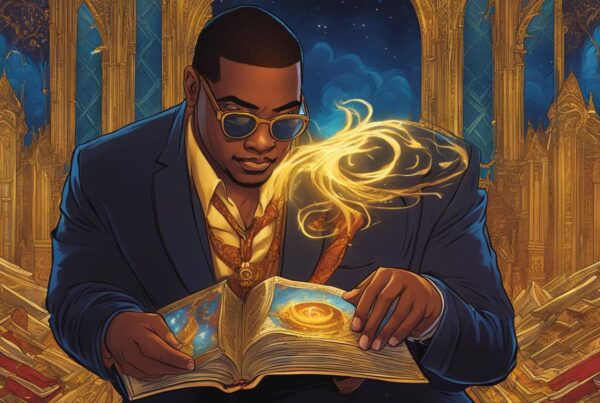Orson Scott Card’s Women of Genesis series continues with Rebekah, the second installment. This book follows Rebekah’s journey, a biblical figure, as she faces challenges and makes decisions that shape her destiny. In this article, we’ll provide a book summary of Rebekah, exploring the key themes, characters, and plot points. Join us as we delve into the world of Women of Genesis and uncover the intricacies of Rebekah’s story.
About the Author: Orson Scott Card
Orson Scott Card is an American author, born on August 24, 1951. He is best known for his science fiction and fantasy works and is the author of several award-winning novels and series. Card has won numerous awards, including the Hugo Award and the Nebula Award, among others, and has been inducted into the Science Fiction and Fantasy Hall of Fame.
Card has a unique writing style that incorporates elements of science fiction, fantasy, and spirituality. His books often explore moral and ethical dilemmas and grapple with complex themes related to identity, society, and human nature.
Prior to the Women of Genesis series, Card wrote several popular novels, including Ender’s Game, Speaker for the Dead, and Seventh Son, among others. His works have been adapted into several successful movies and TV series, solidifying his status as a prominent figure in the science fiction and fantasy genre.
“I do not believe in political solutions. I believe in personal solutions that in turn transform the politics.”
Introduction to ‘Women of Genesis’
The Women of Genesis series by Orson Scott Card is a captivating collection of novels that retells the stories of some of the most prominent women in the Bible. The series spans four books, each of which focuses on a different female character and her unique journey.
The overarching theme of the series is the role of women in society and their interactions with the divine. Card explores complex issues such as identity, empowerment, and faith through the lens of these women’s experiences.
Each of the books in the series can be read independently, but they are interconnected by their common themes and the overarching story of the patriarchs and matriarchs of the Bible. Rebekah’s story is the second installment in the series, and it offers readers an intimate look at one of the most fascinating women in the Bible.

With his unique style and impeccable attention to detail, Card paints a vivid portrait of ancient life and the struggles and triumphs of these incredible women. Whether you’re a biblical scholar or simply a lover of great storytelling, the Women of Genesis series is a must-read.
Rebekah’s Story: Overview
In Rebekah, the biblical story of Isaac’s wife, Orson Scott Card provides a richly-detailed narrative that brings this ancient tale to life. The book chronicles Rebekah’s journey from her upbringing in the house of Nahor to her marriage to Isaac and beyond. Along the way, readers gain insight into Rebekah’s complex family dynamics and the cultural and societal norms that governed her world.
Rebekah’s story is one of struggle, perseverance, and ultimately, triumph. From her early years as a young girl to her role as a wife and mother, Rebekah faces numerous challenges, including familial conflict, infertility, and even political turmoil. Despite these obstacles, she remains true to herself and her faith, drawing strength from her deep-seated convictions and her unyielding spirit.
The book is organized into chapters that follow the major events in Rebekah’s life, including her encounter with Isaac at the well, her decision to leave her family and travel to a new land, and her role in helping to secure a future for her family and descendants. Card’s vivid prose and attention to detail help to transport readers to Rebekah’s world, immersing them in the sights, sounds, and emotions of this epic tale.
Character Analysis: Rebekah
In Rebekah, Orson Scott Card presents readers with a complex and multifaceted character in the eponymous heroine. Rebekah is a woman of great courage, resourcefulness, and resilience, and she faces a series of challenges throughout the course of the book that test her character in a variety of ways.
One of the most striking aspects of Rebekah’s character is her unwavering commitment to her family. Although she begins the book as a young woman with her own hopes and aspirations, she puts these aside in order to help fulfill her family’s needs. This selflessness is a defining trait that endears Rebekah to readers.
Despite her virtues, Rebekah is not without flaws. At times, she can be stubborn and headstrong, refusing to listen to others’ advice even when it might benefit her. This trait is particularly evident in her relationship with her husband, Isaac, whom she often defies to achieve her goals.
However, over the course of the book, Rebekah’s character undergoes a transformation. As she begins to confront the consequences of her decisions, she gains a greater sense of self-awareness and learns to recognize her own limitations. This growth is a testament to Card’s skill as a writer, and to his ability to create characters who are both believable and multidimensional.
Overall, Rebekah is a character who will resonate with readers long after they’ve finished the book. Her strength, her flaws, and her evolution as a person all contribute to a compelling and memorable portrayal.
Themes and Symbols
Orson Scott Card’s Rebekah employs various themes and symbols that enhance readers’ understanding of the book’s underlying messages and moral dilemmas.
The Importance of Family
Family is one of the central themes explored in Rebekah. The book emphasizes the importance of familial relationships and the impact that they have on an individual’s life, both positively and negatively. For instance, Rebekah’s relationship with her brother, Laban,
plays a significant role in shaping her experiences and decisions throughout the book.
The Symbolism of Marriage
Marriage is another prominent theme in the book, and it is portrayed symbolically through different characters’ experiences. The book suggests that marriage is often a transactional arrangement that is driven by practical considerations rather than love. The symbol is emphasized
through the story of Rebekah and Isaac, whose marriage is arranged by their families and only develops into a loving relationship much later.
Moral Ambiguity and Deception
Rebekah explores the concept of moral ambiguity and deception through the actions of its characters. It suggests that good people sometimes do bad things, and the line between right and wrong can be blurred, depending on one’s perspective. This theme is embodied by the character of Rebekah, who is driven by a strong desire to protect her family and is willing to resort to deception to achieve her goals.
“Rebekah’s experiences showcase the complex nature of family relationships, the ambiguous nature of morality, and the symbolic significance of traditional institutions like marriage. These themes and symbols add depth and nuance to the book’s narrative, making it an engaging and thought-provoking read.”
Writing Style and Narrative Structure
Orson Scott Card’s writing style is characterized by his skillful use of language, vivid descriptions, and well-crafted dialogue that immerses readers into the world of Rebekah. His narrative structure complements his writing style, with a well-planned plot and pacing that builds tension and suspense as the story progresses.
Card’s use of figurative language and imagery helps to bring Rebekah and the other characters to life. Through his descriptions, readers can visualize the landscapes, actions, and emotions of the characters. For instance, in one of the key scenes, Card uses imagery to describe the way Rebekah’s beauty captivates Isaac:
“… her beauty…was like nothing else he had ever seen. Her hair was as soft as the finest silk, her eyes as deep and blue as the ocean. Isaac felt his heart skip a beat as she walked towards him….It was as if she had walked out of a dream, and he was unable to look away.”
Card’s ability to paint vivid pictures with his words makes the reading experience more engaging and allows readers to connect with the characters on a deeper level.
The narrative structure of Rebekah is also a testament to Card’s skill as a storyteller. The story is well-paced and moves seamlessly from one plot point to the next, with each event building on the last to create a cohesive and engaging narrative. Card masterfully weaves in themes of family, love, and sacrifice, making the story relatable and emotionally resonant.

Critical Reception and Impact
Orson Scott Card’s Rebekah, the second book in the Women of Genesis series, received widespread critical acclaim upon its release. Critics noted the author’s vivid storytelling and masterful portrayal of the ancient biblical story of Rebekah and her family.
Many praised the book for its deep characterization and exploration of complex themes such as family, loyalty, and faith. Reviewers also lauded Card’s writing style, particularly his use of lyrical prose and evocative imagery.
Rebekah was a finalist for the 2002 Nebula Award for Best Novel, and won the 2002 Locus Award for Best Fantasy Novel. The book’s success propelled the Women of Genesis series to be a New York Times bestseller.
Beyond its literary accolades, Rebekah has had a lasting impact on readers and the wider literary community. The book’s nuanced portrayal of biblical characters and themes has inspired renewed interest in the Women of Genesis series and led to further exploration of the genre.
“Rebekah is a literary masterpiece, offering readers a heartfelt and profound exploration of the human experience. Card has crafted a novel that transcends the boundaries of genre and offers readers a poignant and moving portrayal of one of the most fascinating figures in biblical history.”
Conclusion
Rebekah (Women of Genesis, #2) by Orson Scott Card is a captivating portrayal of Rebekah’s story from the book of Genesis. Through Card’s masterful storytelling and characters that are brought to life, readers are transported back in time to a world of complex family dynamics, intense emotions, and moral dilemmas.
In this article, we have explored the key themes, characters, and plot points covered in Rebekah. We have provided an overview of Orson Scott Card’s writing style, analyzed the character of Rebekah, and delved into the book’s underlying themes and symbols. We have also explored the critical reception and impact of the book, offering insights into its significance within the genre.
Overall, Rebekah (Women of Genesis, #2) is a must-read for fans of historical fiction and biblical retellings. While the book stays true to the source material, Card adds his own unique voice and perspective to the story, creating a rich and immersive reading experience.
In conclusion, Rebekah is a testament to Card’s talent as a writer and his ability to transport readers to another time and place. We highly recommend this book to anyone looking for a thought-provoking and engaging read.



